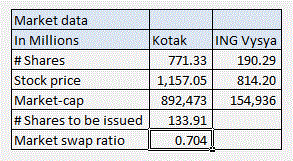The merger of ING Vysya Bank with Kotak Mahindra Bank was announced on 20 November 2014. The next day the stock price of both the banks rallied suggesting that the market liked the deal.
On 21 Nov, ING Vysya closed at 7.83% higher than 19 Nov price:
And Kotak closed at 11.59% higher:
It looks like the market liked Kotak better than ING Vysya. Is that fair? Do ING Vysya shareholders feel let down?
At the time of my analysis the market data was as follows:
Based on the market information Kotak would have had to issue 133.91 M shares to acquire ING Vysya, and swap ratio would have been 0.704 Kotak shares for each of ING Vysya shares. The actual swap ratio is 0.725:1; Not too far off. Again, is this a fair deal?
Kotak is retaining almost all of its income:
While earnings per share of both the banks have increased at a similar rate (about 14%) in the last four years, Kotak has not been that generous in terms of dividends payout, which implies that it is considering high growth potential for its business.
In order to check whether this deal is value accretive to the shareholders of both the banks we have to value each of them on a stand-alone basis first, and then on a combined basis.
With an expected annual growth rate (10-year) of about 15%+ for Kotak and about 11%+ for ING Vysya, we can value individual banks independently based on dividend-discount-model. Both banks are expected to have stable payout ratio, return on equity and growth rate after ten years.
Caution: Since I have used dividend-discount model for valuation, regulatory capital requirements are not separately considered. Probably, it makes sense to do another valuation based on capital adequacy required to achieve the target growth rate, although capital adequacy and Tier 1 capital ratio at present are at comfortable levels for both the banks.
Caution: Since I have used dividend-discount model for valuation, regulatory capital requirements are not separately considered. Probably, it makes sense to do another valuation based on capital adequacy required to achieve the target growth rate, although capital adequacy and Tier 1 capital ratio at present are at comfortable levels for both the banks.
Based on the valuation, both Kotak and ING Vysya appear to be highly over-priced by the market. That is, Kotak is using its expensive currency (high stock price) to buy another expensive currency. Since the actual swap ratio is close to the market-swap ratio, the first impression is that Kotak shareholders are benefiting more from this deal.
Even without considering any benefits from synergy, I reckon the swap ratio should have been about 0.879 Kotak shares for each of ING Vysya shares. Kotak should have issued 167.36 M shares assuming that market prices would correct to their rational (lower) levels in time to reflect the true fundamentals. Alas, market prices are higher, and as noted above, based on those prices Kotak should have issued 133.91 M shares. The actual swap ratio is much lower.
But then as talked about in every acquisition, there are synergy benefits.
If there are any synergy benefits from this merger, surely Kotak shareholders must have an upper hand over ING Vysya shareholders. The actual swap ratio of 0.725 Kotak shares to each of ING Vysya shares is much lower, and hence value-accretive to Kotak shareholders.
The implied value of this deal is Rs.159 B, and the implied price of the stock of ING Vysya bank is Rs.838.86 per share. There is hardly any premium on acquisition; sounds so unfamiliar, doesn't it?
Why is ING Groep, the largest shareholder in ING Vysya, letting this happen to itself? Is it because it is in need of cash? If so, what about the minority shareholders?
Why is ING Groep, the largest shareholder in ING Vysya, letting this happen to itself? Is it because it is in need of cash? If so, what about the minority shareholders?











